Facing Their Father
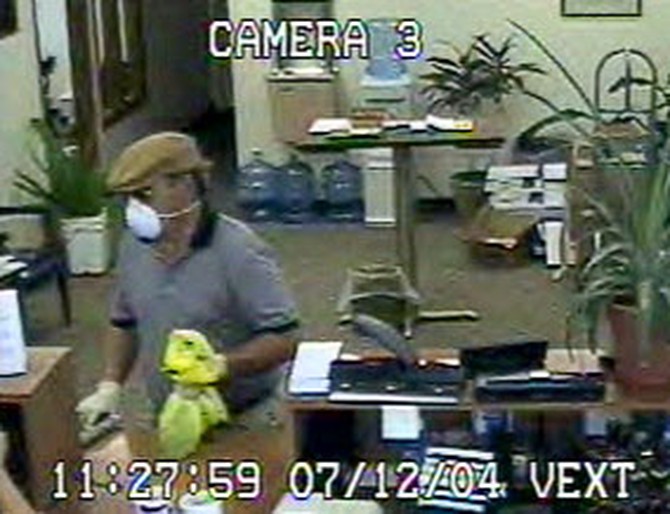
In January 2006, Jared, Garrett and Clay Ginglen came to The Oprah Winfrey Show to talk about the difficult decision they made to turn in their father into the authorities.
Bill Ginglen, by all accounts, was an upstanding citizen—a former Marine, a loving husband, a devoted father and grandfather.
Then on August 19, 2004, Jared, a Peoria, Illinois, police officer, read a story in the paper about a series of bank robberies in another part of the state. "The description just oddly matched my father to a tee," Jared says. "The description of the vehicle—the getaway car—was the same vehicle my father drove. And he spends time over in that area."
As Jared continued reading, he noticed that the newspaper story referenced a website set up by local police authorities that contained surveillance photos of one of the robberies. "Just to clear up my own mind [I thought] I'd go look and make sure that it wasn't him," Jared says. "But it was." Jared immediately called his brothers.
Together, Jared, Garrett and Clay agreed to confront their father. They went to his home, but he wasn't there. It was then the brothers made the most gut-wrenching decision of their lives—to immediately contact local police and turn their father in.
Bill is now serving a 40-year sentence for seven counts of armed robbery.
Bill Ginglen, by all accounts, was an upstanding citizen—a former Marine, a loving husband, a devoted father and grandfather.
Then on August 19, 2004, Jared, a Peoria, Illinois, police officer, read a story in the paper about a series of bank robberies in another part of the state. "The description just oddly matched my father to a tee," Jared says. "The description of the vehicle—the getaway car—was the same vehicle my father drove. And he spends time over in that area."
As Jared continued reading, he noticed that the newspaper story referenced a website set up by local police authorities that contained surveillance photos of one of the robberies. "Just to clear up my own mind [I thought] I'd go look and make sure that it wasn't him," Jared says. "But it was." Jared immediately called his brothers.
Together, Jared, Garrett and Clay agreed to confront their father. They went to his home, but he wasn't there. It was then the brothers made the most gut-wrenching decision of their lives—to immediately contact local police and turn their father in.
Bill is now serving a 40-year sentence for seven counts of armed robbery.
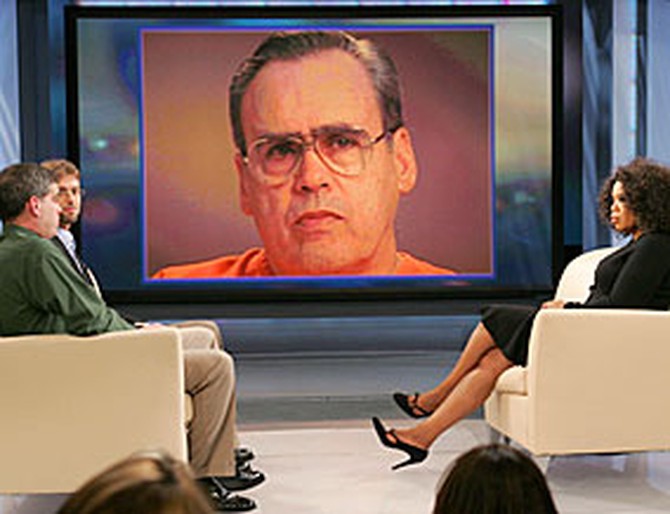
Jared, Garrett and Clay say that after Bill's arrest, they discovered his bank-robbing sprees were just a small part of a double life he was leading. According to authorities, Bill had been having an affair for many years and was experimenting with drugs. The three sons say they feel betrayed by their father. "It makes you have to go back to the life that you thought you knew and rethink everything about that," Garrett says.
For the first time since his sentencing, Bill faces Garrett and Clay via satellite from a correctional facility in Taylorville, Illinois. Jared, who has not talked with his father since his arrest, chooses not to sit in the studio.
For the first time since his sentencing, Bill faces Garrett and Clay via satellite from a correctional facility in Taylorville, Illinois. Jared, who has not talked with his father since his arrest, chooses not to sit in the studio.
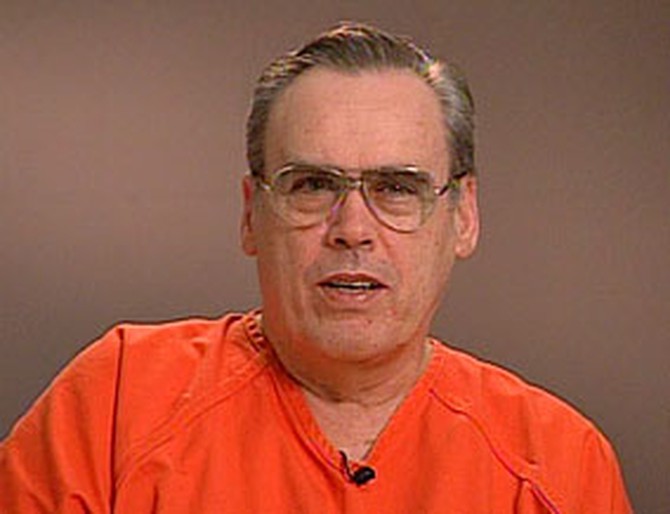
Bill says he cannot really explain what he calls an "aberration of what otherwise has been a good life"—how he spiraled from an upstanding citizen into a felon who committed seven robberies at five different banks.
"I don't know that you actually make that decision as a conscious thing. It sort of develops," he says. "Opportunities seem to arise, and if you're stupid enough at the time, you'll take advantage of the opportunity. And apparently that's what I did."
The abrupt change in Bill's behavior was some kind of late-life crisis, from feeling "all used up," he says.
"I had tried to find employment. I probably sent out 500 applications and resumés—no luck," he says. "I think I finally realized that age discrimination was real, that getting older was real [and] that some of the ideals that I had advocated all my life might not have been real, which troubled me greatly. I found out that guilt is real. ... You think you can do some things and it won't trouble you, but you find that they do."
"I don't know that you actually make that decision as a conscious thing. It sort of develops," he says. "Opportunities seem to arise, and if you're stupid enough at the time, you'll take advantage of the opportunity. And apparently that's what I did."
The abrupt change in Bill's behavior was some kind of late-life crisis, from feeling "all used up," he says.
"I had tried to find employment. I probably sent out 500 applications and resumés—no luck," he says. "I think I finally realized that age discrimination was real, that getting older was real [and] that some of the ideals that I had advocated all my life might not have been real, which troubled me greatly. I found out that guilt is real. ... You think you can do some things and it won't trouble you, but you find that they do."
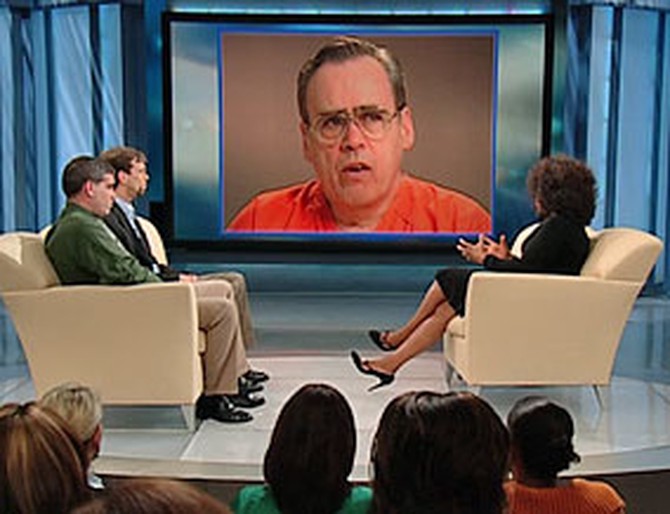
Oprah: What do you want to say to your sons and to your wife?
Bill: The theme is that the boys did what they felt was the right thing. I admire and respect that. I taught them to do that; I have no problem with that. I don't know if I agree with that 100 percent, but I agree that they felt that they were doing the right thing.
Oprah: Why wouldn't you agree with it since that's what you taught them to do?
Bill: Because I think it would have been better if it would have been handled differently. I would have probably came out of this a little better, personally, if they had called me and I had the opportunity to turn myself in.
Oprah: Just let me set this scenario: You are going to be moved to another prison where heaven only knows when you will see or talk to your family again. I asked you a question: What do you want to say? Your sons are in pain, your wife is in pain, you've caused a lot of people to be devastated in their lives by your actions. And the first thing you have to say is you wished they'd handled it differently?
Bill: That's not really the first thing I had to say. The first thing I had to say was I feel like they did the right thing because they felt it was the right thing.
Bill: The theme is that the boys did what they felt was the right thing. I admire and respect that. I taught them to do that; I have no problem with that. I don't know if I agree with that 100 percent, but I agree that they felt that they were doing the right thing.
Oprah: Why wouldn't you agree with it since that's what you taught them to do?
Bill: Because I think it would have been better if it would have been handled differently. I would have probably came out of this a little better, personally, if they had called me and I had the opportunity to turn myself in.
Oprah: Just let me set this scenario: You are going to be moved to another prison where heaven only knows when you will see or talk to your family again. I asked you a question: What do you want to say? Your sons are in pain, your wife is in pain, you've caused a lot of people to be devastated in their lives by your actions. And the first thing you have to say is you wished they'd handled it differently?
Bill: That's not really the first thing I had to say. The first thing I had to say was I feel like they did the right thing because they felt it was the right thing.
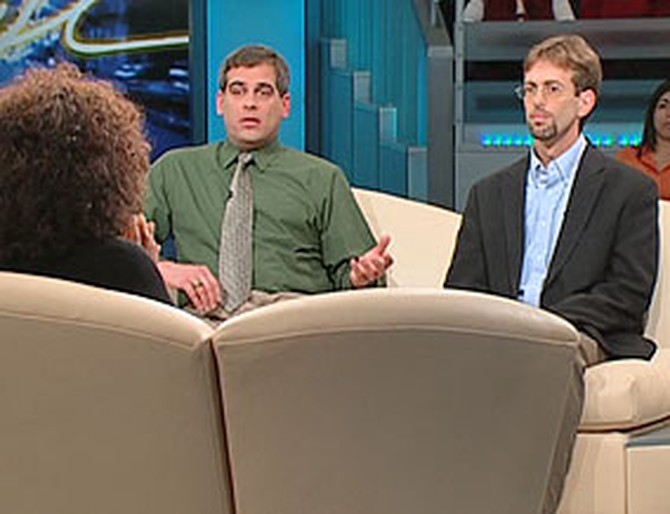
Garrett says his father's disappointment with the way he and his brothers handled the situation is especially hurtful. "What I really want, and this may sound completely strange, but I want him to understand what I did ... like I'm still seeking his approval for [turning him in]. Like I always did as a child. I want him to understand [that], and I kind of think he should."
He says he and his brothers made a very difficult decision in an extremely uncomfortable situation in large part because they were worried about public safety. "In my mind, at the time, it couldn't have been my dad. It had to be somebody that was out of his mind," Garrett says. "I mean, if he's robbing banks, for crying out loud, he's not the guy I knew."
Bill goes on to ask his sons to accept his plea for forgiveness. "All I can say, gentlemen, is I'm sorry. I've had over 500 days and nights to contemplate this situation. I've made my peace with God. ... I would like to know that at least someday you can forgive what I've done and get past this and we can communicate like we used to."
He points to his conditional guilty plea as proof that he wanted to spare his family the additional pain of a potentially long jury trial.
Clay says he's forgiven his father, explaining that he did not take the robberies as a personal insult. He speaks with Bill regularly on the phone. Jared has had no contact with Bill. Garrett says he's still deciding what to do.
He says he and his brothers made a very difficult decision in an extremely uncomfortable situation in large part because they were worried about public safety. "In my mind, at the time, it couldn't have been my dad. It had to be somebody that was out of his mind," Garrett says. "I mean, if he's robbing banks, for crying out loud, he's not the guy I knew."
Bill goes on to ask his sons to accept his plea for forgiveness. "All I can say, gentlemen, is I'm sorry. I've had over 500 days and nights to contemplate this situation. I've made my peace with God. ... I would like to know that at least someday you can forgive what I've done and get past this and we can communicate like we used to."
He points to his conditional guilty plea as proof that he wanted to spare his family the additional pain of a potentially long jury trial.
Clay says he's forgiven his father, explaining that he did not take the robberies as a personal insult. He speaks with Bill regularly on the phone. Jared has had no contact with Bill. Garrett says he's still deciding what to do.

Since his incarceration, Bill says he's spent a lot of time thinking and that he has learned an important lesson about himself. "[I learned] that the depth of character that I felt I always had wasn't as deep as what I thought," Bill says.
Bill says he's also spent his time in prison reading and writing. He's even written an article about whether he'd turn in his own father for a crime. His conclusion? "Unless it was unusual circumstances, [for example, if my] father was a pedophile or murderer or kidnapper ... or committed a violent crime against a person, I don't know. I didn't come to a successful conclusion on answering that."
Bill says he's also spent his time in prison reading and writing. He's even written an article about whether he'd turn in his own father for a crime. His conclusion? "Unless it was unusual circumstances, [for example, if my] father was a pedophile or murderer or kidnapper ... or committed a violent crime against a person, I don't know. I didn't come to a successful conclusion on answering that."

The way to tell a person has recovered—whether it be for drugs, alcohol, food or criminal behavior—is when they're so busy apologizing for how they've injured loved ones that they forget their own pain, says psychologist Dr. Robin Smith. In her opinion, Bill has not gotten to this point yet.
"Bill, as you're talking, you're still focused on yourself and the ways in which your sons don't understand you," Dr. Robin says. "What's happening is you're reinjuring your children even in this very moment by not seeing the fact that you put them in a position where they had to make a choice to, not just protect you, but to protect other people."
Dr. Robin recommends that instead of repenting and asking God for forgiveness, Bill needs to refocus his energy toward the human beings he's injured. Bill keeps saying "I'm sorry," but his apology sounds and feels empty, Oprah says.
"Bill, as you're talking, you're still focused on yourself and the ways in which your sons don't understand you," Dr. Robin says. "What's happening is you're reinjuring your children even in this very moment by not seeing the fact that you put them in a position where they had to make a choice to, not just protect you, but to protect other people."
Dr. Robin recommends that instead of repenting and asking God for forgiveness, Bill needs to refocus his energy toward the human beings he's injured. Bill keeps saying "I'm sorry," but his apology sounds and feels empty, Oprah says.

Although Bill is alive and well in a state correctional facility, Dr. Robin says his sons are struggling with feelings of grief.
"I'm so moved because the courage it takes to face one who is not dead but who feels dead is huge," Dr. Robin says. "Part of the issue is that their father, as they knew him, has died. And it's not just for them, but for all of us who have known people who are still walking the planet, but who aren't who we thought they were—the grief that it stirs up is so profound."
Oftentimes, people disguise grief with anger, she says. Jared may be waiting for Bill to reach out to him through letters or phone calls...even though he forbid his father from contacting him.
Dr. Robin tells Bill that his sons are searching for a heartfelt apology and acknowledgment of their pain. "They're looking for a piece of your heart that they can't find," Dr. Robin says. "They're asking ... 'Where is your heart about how much we ache?'"
Forgiveness is a long process, Dr. Robin reminds the Ginglen family. "It's not something we do in a moment," she says. "We arrive at the door of forgiveness. We arrive at a place where our heart takes in a little forgiveness, and then sometimes, it snatches it back. Then, we move toward it again."
"I'm so moved because the courage it takes to face one who is not dead but who feels dead is huge," Dr. Robin says. "Part of the issue is that their father, as they knew him, has died. And it's not just for them, but for all of us who have known people who are still walking the planet, but who aren't who we thought they were—the grief that it stirs up is so profound."
Oftentimes, people disguise grief with anger, she says. Jared may be waiting for Bill to reach out to him through letters or phone calls...even though he forbid his father from contacting him.
Dr. Robin tells Bill that his sons are searching for a heartfelt apology and acknowledgment of their pain. "They're looking for a piece of your heart that they can't find," Dr. Robin says. "They're asking ... 'Where is your heart about how much we ache?'"
Forgiveness is a long process, Dr. Robin reminds the Ginglen family. "It's not something we do in a moment," she says. "We arrive at the door of forgiveness. We arrive at a place where our heart takes in a little forgiveness, and then sometimes, it snatches it back. Then, we move toward it again."
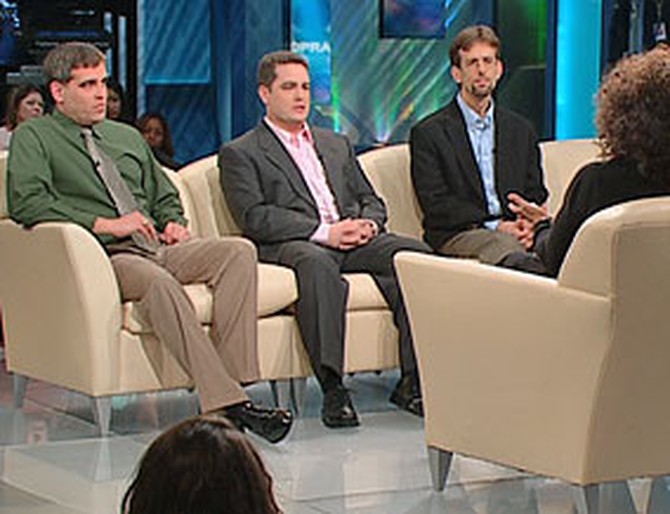
Bill says goodbye to Clay and Garrett, and Jared joins his brothers onset. Jared, who refused to face his father, says watching the interview didn't make him feel pity—it only made him angry.
"I don't trust him, and I don't believe him," Jared says. "He just devastated us. I didn't want to speak to him. I didn't want to give him the satisfaction of seeing me upset. ... I carry around so much rage at what he did to his family that I don't know if I'll ever be able to forgive him."
Clay, Garrett and Jared are all still upset about how Bill treated their mother, Donna.
"She did everything right, and she supported him, and she didn't question him," Clay says. "She was an excellent wife, and then she got this dumped on her."
The Ginglen sons say Donna never received a penny of the $56,000 Bill stole, and now that he's in jail, she has to pay restitution to the banks on her own. This financial burden has weighed heavily on the family. According to her sons, Donna almost lost her home and to keep up with the mortgage payments, she got a job for the first time at age 59.
"I don't trust him, and I don't believe him," Jared says. "He just devastated us. I didn't want to speak to him. I didn't want to give him the satisfaction of seeing me upset. ... I carry around so much rage at what he did to his family that I don't know if I'll ever be able to forgive him."
Clay, Garrett and Jared are all still upset about how Bill treated their mother, Donna.
"She did everything right, and she supported him, and she didn't question him," Clay says. "She was an excellent wife, and then she got this dumped on her."
The Ginglen sons say Donna never received a penny of the $56,000 Bill stole, and now that he's in jail, she has to pay restitution to the banks on her own. This financial burden has weighed heavily on the family. According to her sons, Donna almost lost her home and to keep up with the mortgage payments, she got a job for the first time at age 59.
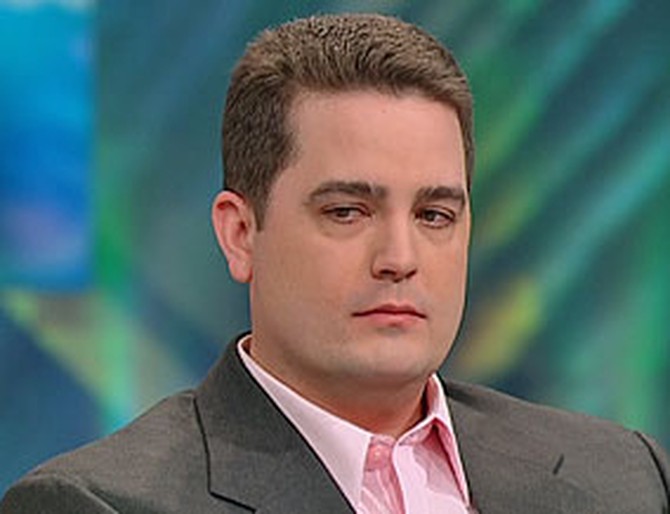
After his first visit to The Oprah Winfrey Show, Jared says he started writing. This has helped him express his thoughts, but it hasn't helped him get past the pain, he says.
Jared says he bottles his emotions up and predicts that someday, he'll either "let it out or ... die of a heart attack. "I see [my father] crying, and it didn't phase me," Jared says. "But I see [Garrett] upset, and I just want to just explode."
Holding back the tears isn't healthy, Dr. Robin says. Oftentimes, she warns, men "lose it" because they're trying not to cry. "It's killing men. It's killing their spirits, and it's killing their bodies. Soldiers have to learn where to cry—not if they cry."
Dr. Robin suggests that Jared find a safe place to let the tears flow. "You know why?" she asks. "Because it's the truth of what's there and what your pain deserves."
Jared says he bottles his emotions up and predicts that someday, he'll either "let it out or ... die of a heart attack. "I see [my father] crying, and it didn't phase me," Jared says. "But I see [Garrett] upset, and I just want to just explode."
Holding back the tears isn't healthy, Dr. Robin says. Oftentimes, she warns, men "lose it" because they're trying not to cry. "It's killing men. It's killing their spirits, and it's killing their bodies. Soldiers have to learn where to cry—not if they cry."
Dr. Robin suggests that Jared find a safe place to let the tears flow. "You know why?" she asks. "Because it's the truth of what's there and what your pain deserves."
Published 01/30/2006

